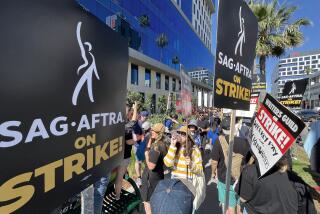Owners’ Proposal Seeks Salary Cap, 50-50 Revenue Split : Baseball: Plan also would end arbitration. Fehr not impressed.
- Share via
Eighteen months after reopening the collective-bargaining agreement, major league baseball owners finally presented an economic proposal to the players’ union Tuesday that calls for a salary cap and a 50-50 split of all revenue.
The proposal, which did nothing to lessen the threat of a players’ strike after the July 12 All-Star game, would also:
-- Eliminate salary arbitration.
-- Permit players with four to six years of major league service to become free agents, compared to the six years now required, but would allow a player’s current club to retain him by matching his highest offer.
-- Establish an escalating scale of minimum salaries for players with fewer than four years of service, those minimums to be negotiated collectively.
The proposal calls for a seven-year contract, with the new compensation system phased in over the first four years.
Richard Ravitch, the owners’ chief negotiator, said the system would restore economic sanity and competitive balance and be worth an estimated $7 billion to $11.7 billion to the players over the seven years. Depending on the average obligation to the players under the 50-50 revenue split, no team could have a payroll of more than 110% of that average or less than 84%.
“There has to be some flexibility because the disparity (in revenue among the 28 clubs) is so great it can’t be bridged by revenue sharing,” Ravitch said of the cap.
Don Fehr, executive director of the players’ union, accused the owners of conducting a “media circus” by scheduling a New York news conference to release their proposal shortly after it was finally presented to the union.
The union’s executive board will meet in Chicago on Thursday and in Pittsburgh, site of the All-Star game, on July 11, presumably to set a strike date.
The union fears the owners will declare an impasse and unilaterally impose a new system if there is no agreement before the end of the 1994 World Series. A strike before the end of the season is their only leverage, the players believe.
According to Ravitch, and assuming revenues do not drop below projected 1994 levels, the owners’ proposal ensures that player compensation will not fall below this year’s total of $1 billion, which produced an average salary of $1.2 million.
Baseball’s revenues, Ravitch said, have grown at an annual rate of 14% over the last 15 years. At that rate, he said, the seven-year proposal would be worth $11.7 billion to the players and would produce an average salary of $2.6 million in 2001. He said 58% of 1994’s projected revenue of $1.72 billion will go to player compensation but added: “I would rather be guaranteed 50% (as proposed) because I don’t think revenues will continue to grow at the current rate.”
However, the 50% players’ share also would be used to finance their pension plan, health coverage, playoff pools and other benefits, with the players determining the breakdown.
Fehr said he needed time to study the 27-page proposal but dismissed the projections because management’s figures “have never been close to the mark.” On the surface, he said, it significantly lowers the players’ percentage and “transfers revenue in large amounts from the players to the clubs.”
Ravitch said the proposed figures are open to negotiation, that the owners are only wedded to the concept. He said that without the change “more and more clubs will fall into the have-not category” and the industry’s growth will be jeopardized.
“We gave up our leverage when we agreed not to stage a lockout, but the union has been talking strike without even knowing what our proposal was,” he said. “I don’t want to see a strike, I want to negotiate.
“We’re not trying to hurt the players. We’re only trying to determine how the growth of revenues will be divided . . . and give the clubs a way to predict costs. . . . If the players think they’re going to scare the owners into giving up the necessity of changing the economic system, they’re very wrong. I hope the fans don’t pay for (the players’) misjudgment.”
A labor agreement must be approved by 75% of the owners, but many in baseball believe management solidarity in the face of a prolonged work stoppage that would threaten the new TV agreement and playoff format remains fragile at best, with many of the big-market clubs preferring the status quo over a stoppage.
More to Read
Go beyond the scoreboard
Get the latest on L.A.'s teams in the daily Sports Report newsletter.
You may occasionally receive promotional content from the Los Angeles Times.










